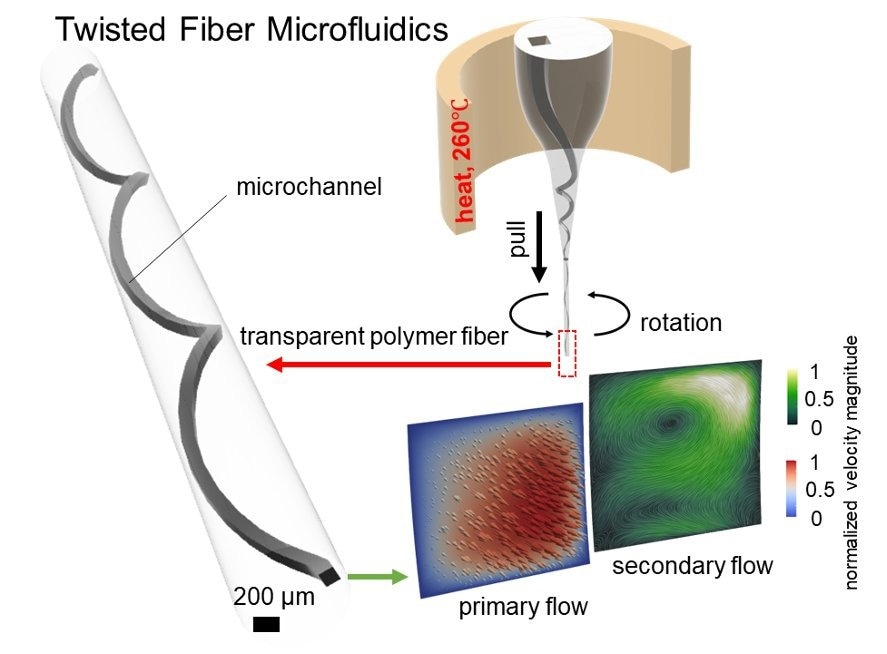A group of scientists from the Okinawa Institute of Science and Technology (OIST) and Tohoku University have been able to conduct accurate and effective fluid manipulation in three-dimensional microscale settings.
 Conceptional diagram: Twisted Fiber Microfluidics Image Credit: Kato et al.
Conceptional diagram: Twisted Fiber Microfluidics Image Credit: Kato et al.
Details of the breakthrough were published in the journal Microsystems and Nanoengineering.
Since microfluidic devices can handle extremely small fluid volumes, researchers can carry out processes and analyses with amazing accuracy and efficiency. Microfluidic technology has advanced rapidly in the last few years in several fields, including biology, chemistry, and medicine. Three-dimensional spiral microfluidic devices stand out as revolutionary among them.
Particle separation, reagent mixing, and precise fluid control are made possible by the complex corkscrew-like design. However, the current fabrication challenges are impeding the potential to revolutionize bioanalytical applications. In addition to being expensive and time-consuming, the process restricts the variety of materials and structural arrangements that can be used.
Inspired by traditional Japanese candy-making methods, such as the creation of Kintaro-ame, an interdisciplinary team from Tohoku University and OIST has developed a miniaturized rotational thermal drawing process (mini-rTDP) to overcome these limitations.
The creative method involves turning the components while they are being heated to create complex three-dimensional structures inside the fibers. This method is incredibly flexible because it can be used with a broad variety of materials that will distort when heated, opening up countless opportunities to combine different materials.
Mini-rTDP facilitates rapid-prototyping of three-dimensional microfluidic systems, ideal for precise biofluid manipulation.
Yuanyuan Guo, Associate Professor, Frontier Research Institute for Interdisciplinary Sciences (FRIS), Tohoku University
Mini-rTDP involves creating a molded polymer preform containing channels, which are subsequently stretched and heated to generate microfluidic channels within a fiber. These channels can then be further rotated to shape three-dimensional spiral configurations.
Shunsuke Kato, Study First Author and Junior Researcher, Frontier Research Institute for Interdisciplinary Sciences (FRIS), Tohoku University
In collaboration with Amy Shen, leader of the Micro/Bio/Nanofluidics Unit at OIST, the interdisciplinary Tohoku-OIST team conducted simulations and experiments to visualize fluid flows within the spiral structures.
Daniel Carlson from Shen’s group remarks, “We have confirmed the presence of Dean vortices, a type of rotational flow occurring in curved channels, in our devices, thus affirming their potential for significantly enhancing cell and particle separation efficiency. The rapid prototyping of three-dimensional spiral microfluidics using mini-rTDP represents a remarkable advancement in the field of microfluidics. This technology offers unparalleled versatility, precision, and the potential to catalyze transformative changes across various industries.”
Guo elaborates, “Furthermore, we are actively pursuing the integration of microfluidic channels with functionalities such as electrodes, biosensors, and actuators directly into fibers. This endeavor has the potential to revolutionize Lab-on-Chip bioanalytical technologies.”
This study demonstrates the strong collaboration and synergy between these two organizations and is a tribute to the cooperative efforts of the OIST SHIKA program and the matching funds given by Tohoku University.
Journal Reference:
Kato, S., et al. (2024) Twisted fiber microfluidics: a cutting-edge approach to 3D spiral devices. Microsystems & Nanoengineering. doi.org/10.1038/s41378-023-00642-9
Source: https://www.tohoku.ac.jp/en/index.html